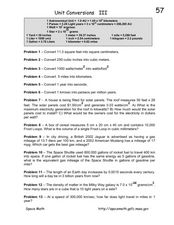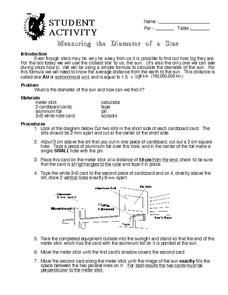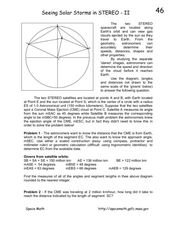Curated OER
Unit Conversions III
In this unit conversions worksheet, students solve 13 problems using given conversion factors to convert measurements from one unit of measurement to another.
Curated OER
Distances in Space
In this distances in space worksheet, students learn about astronomical units and light years as measurements for great distances. Students use both of these units of measurements to solve five problems.
Curated OER
Space Weight, Gravity, and Distance
In this planets in space worksheet, high schoolers calculate their weight on the 9 planets plus calculate the distance of the planets from the sun in astronomical units. This worksheet has 6 fill in the blank and 3 short answer questions.
Curated OER
Scientific Notation
Review conversion of decimal numbers into SN form with these examples of common astronomical applications and quantities. Young learners rewrite those numbers with scientific notation and with the correct units. The answers are available...
Curated OER
The Inner Planets
In this planets worksheet, students review the characteristics of the inner planets: Mars, Venus, Earth, and Mercury. This worksheet has 15 multiple choice questions.
Curated OER
Rates and Slopes: An Astronomical Perspective
In this rates and slopes worksheet, students solve 2 problems where they find the rate corresponding to the speed of the galaxies in a Hubble diagram for galaxies and they calculate the rate of the sunspot number change between indicated...
NASA
Benford's Law
In this Benford's Law learning exercise, high schoolers read about the first digit frequency of numbers. Students solve 3 problems about sunspot numbers, solar wind magnetism and the depth of the latest earthquakes by using on line sites...
Curated OER
A Trillion Here...A Trillion There
In this working with large numbers worksheet, students are given the finance statistics for the US and the world for the 2006-2007 year. Students solve 11 problems including finding averages and percentages for the given statistics and...
Laboratory for Atmospheric and Space Physics
Planetary Distances on the Playground
There's no need to stay inside; get out of the classroom and create a scaled map of the solar system on your playground field! In collaborative groups, scholars identify the distance between the sun and other planets, place planet...
It's About Time
The History and Scale of the Solar System
Take scientists beyond our earthly reach and into the solar system. Pupils create a model of the solar system and discuss strengths and weaknesses of their model. They calculate distances in light years, discuss the nebular theory, and...
Curated OER
Worksheet 24 Spring 1996
In this math worksheet, students find all the vectors in three dimensional space that have the length of 4. Also, the first and third components are the same. Finally, the second component is the sum of the first and third components.
Curated OER
Details from an Exploding Star
In this nebula worksheet, students read about the Crab Nebula and calculate the average speed of the expanding gas. They determine the size of the smallest clumps of gas and they draw the diameter of the solar system to scale.
Curated OER
Exploring Dwarf Planet Eris
In this planet Eris activity, learners read about the discovery of this dwarf planet and its characteristics. Students answer 3 questions about the planets, the classification of planets and the definition of planets. Learners define 7...
Curated OER
Black Holes...V
In this black hole worksheet, students read about the black hole in the center of the Milky Way Galaxy called Sagittarius A and observe a Chandra image of the area where the black hole exists. Students solve two problems which include...
Curated OER
Black Holes IV
In this black holes activity, students read about black holes and solve 3 problems where they calculate the Schwarschild radius of one, the number of grams/second a quasar luminosity implies for another and the number of suns per year a...
Curated OER
The Changing Atmosphere of Pluto
In this atmosphere of Pluto worksheet, students use an equation for the orbit of Pluto to determine the semi-major axis, the semi-minor axis, the ellipticity of the orbit, the aphelion and the perihelion. They also determine the...
Curated OER
The Webb Space Telescope: Detecting Dwarf Planets
In this detecting dwarf planets learning exercise, students read about the Webb Space Telescope that will be launched in 2014 to detect dwarf planets using an infrared telescope. Students solve 3 problems and create a graph for each...
Curated OER
How Hot is that Planet?
In this planet worksheet, students read about finding the temperature of a planet using the distance to its star, its reflectivity and the luminosity of the star. Kids use a given equation to determine the surface...
Curated OER
Measuring The Diameter of a Star
In this space science worksheet, high schoolers find the correct measurements using the tools provided in this lab experiment. The second page is used to record data.
Curated OER
Solar System Lab
In this solar system worksheet, 8th graders make a scale model of the solar system, answer 5 questions and write a conclusion.
Curated OER
Seeing Solar Storms in STEREO-I
In this geometric calculations of solar storms worksheet, students use a diagram indicating the location of 2 STEREO satellites, the earth and the sun to calculate the distance between a Coronal Mass Ejection and the Earth. They use...
Curated OER
Seeing Solar Storms in STEREO-II
In this solar storms worksheet, students use a diagram given the location of two STEREO spacecraft satellites, a coronal mass ejection, the sun and the Earth to solve 2 problems about the coronal mass ejection. Students use segments,...
Curated OER
The Dawn Mission: Ion Rockets and Spiral Orbits
In this ion rocket and orbits worksheet, students read about the spiral orbit the Dawn spacecraft took due to its ion rocket motor. Students solve 3 problems including finding the path taken by the spacecraft, determining the total path...
Curated OER
A Model Solar System
If Earth is modeled by a grapefruit, what planet could be represented by a golf ball? This activity uses everyday and not-so-everyday objects to create a model of the Solar System.
Other popular searches
- Astronomical Unit Leeson
- Astronomical Unit Lesson
- Astronomical Unit Lee Son
- Astronomical Units Activity
- Light Year Astronomical Unit

























